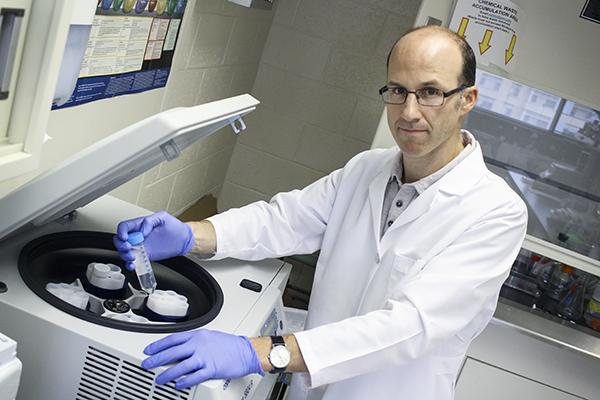Updated: Sept. 28, 2015 at 5:25 p.m.
A professor in the School of Medicine and Health Sciences received a $750,000 grant to lead a research project studying the link between post-traumatic stress disorder and cardiovascular disease.
Paul Marvar, an assistant professor of pharmacology and physiology, said a number of studies have proven that individuals with PTSD have a higher likelihood of developing cardiovascular disease. His study will explain that connection and potentially lead to advancements in treating both diseases.
“We are trying to understand the connections between PTSD and cardiovascular disease developments,” Marvar said. “Potentially, we could help treat not only PTSD, but incidence of cardiovascular disease risks later in life.”
He added that the pattern exists regardless of how the person developed PTSD, whether it was through military service or another traumatic event. PTSD has become an increasingly important area of focus as officials try to best help veterans returning from military service.
He will work with researchers from Emory and Harvard universities on the project. The grant is the American Heart Association’s Collaboration Science Award.
“Ultimately we are looking at similar questions, with different approaches to translate a particular therapy or understand a particular mechanism for the linkage of PTSD and cardiovascular disease,” Marvar said.
Marvar has assembled a multidisciplinary team. Jeanie Park is a renal physiologist in Emory’s department of medicine who studies the physiology of the kidney and works with PTSD patients at her university. Kerry Ressler is a behavioral neuroscientist and expert in genetics and PTSD at Harvard. At GW, they will be studying the cardiovascular irregularities in animal models and at a more basic scientific level, Marvar said.
Marvar’s project was one of four chosen in a competitive application process. He said that after submitting a letter of intent, a few applicants are then asked to submit a full application.
“After that, we went to a full-panel review and we were one of four grants that were successfully funded nationally,” Marvar said. “We are really excited about it.”
Marvar joined GW about two years ago, and before that, he spent five years as a postdoctoral fellow at Emory, where he met Park. The two bonded over a common interest in examining patients with PTSD.
“He works in animal models and I work with humans,” Park said. “We thought it would be really interesting to team up and do translational work to look at mechanisms in humans and animals.”
Park said that if a patient has PTSD, that patient is at a much higher risk for developing high blood pressure and cardiovascular disease later in life. Park will be looking at how a mechanism that helps to maintain blood pressure levels might be influencing sympathetic tones during mental stress in their patients and testing potential drugs.
“The goal is to determine the mechanisms that led to this increased risk of high blood pressure and cardiovascular disease in patients,” Park said.
Marvar will be conducting his research at a laboratory on campus in Ross Hall with a small staff. He said that team includes a graduate student, volunteer undergraduate students and a research technician.
The project started on July 1, and plans for their research is already underway. The award is for three years but the team hopes to have enough data to publish at least two studies within the first year, Marvar said.
“Within the first year, we hope to get a couple publications based on the initial studies, so this involves coordinating with the researchers at Emory and Harvard to make sure those studies are planned accordingly,” Marvar said.
This post was updated to reflect the following correction:
Due to an editing error, the Hatchet incorrectly reported Marvar was a postdoctoral fellow for nine years. He was a fellow for five years. We regret this error.







